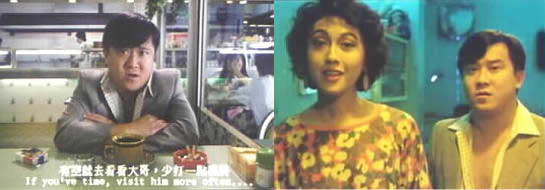Final Victory

Reviewed by YTSL
This 1987 film may well be the only production in
which Wong Kar Wai and Tsui Hark are both involved. When it is realized
that Eric Tsang (one of the founder members of the United Filmmakers Organization
(UFO) as well as a reputable director and actor in his own right) and Patrick
Tam (who served as editor on "Days of Being Wild" and is a respected general
and art director) also were attached to the project, it surely is hard to
not have rather high expectations for this D&B offering. All this
despite its not getting mentioned much in general as well as in the context
of talk about (the work) of any of those HKSAR movie industry luminaries.

FINAL VICTORY has a rather simple plotline; one which, in its essence, really
does involve four individuals for the most part. Indeed, this Wong
Kar Wai scripted movie's story could be easily summarized as being about:
A whiny but well-meaning near mouse of a man (Hung is portrayed by a Beatle-hair-styled
Eric Tsang) being asked by his menacing "Tai Ko" (Tsui Hark is very convincing
as the short-fused Elder Brother Bo) to look after his troublesome wife (Margaret
Lee plays Ping) and sweet-faced mistress (Mimi comes in the form of a very
young-looking Loletta Lee) while he serves some months of prison time, and
what transpires as a result of the interactions of Hung, Ping and Mimi.

Effectively dark comedic complications (inevitably) arise though from such
as: Ping (whom Hung refers to as "Ah So" -- i.e., a respectful Cantonese
term for older sister-in-law) initially not knowing about Mimi's existence;
Mimi needing to be rescued from a Japanese peep show establishment; and Mimi
falling in love with Hung after he does such as retrieve a fallen shoe of
hers and kneels down to gently place it back on her foot (BTW: Watching
this respectful act made me recall Takeshi Kaneshiro's gentle treatment of
Brigitte Lin's shoes and feet in "Chungking Express" and prompts me to wonder
whether Wong Kar Wai has a shoe or foot as well as cleaning fetish?!).
Along the way, we also are witness to some rather offbeat scenes involving
such as ping pong balls, a dried tiger's penis and pachinko machines plus
love communiqués by way of karaoke-style Cantopop warbling by Loletta
Lee and Eric Tsang's characters.

Although FINAL VICTORY has its amusing moments, I frankly found it too unpolished
in feel to be all that enjoyable. The work also suffers from having
an uneven tone. Something that undoubtedly contributed to this -- and
which I could not quite get over -- was each of the movie's principals seeming
to be acting in a style associated with different genres of film: I.e.,
much of Eric Tsang's actions appear to come out of a broad comedy, as does
Margaret Lee's; but Loletta Lee's gestures often seems more representative
of those found in melodramas; whereas Tsui Hark -- who really dominates the
screen in the short periods that he is in the movie -- acted as though he
were in a dark crime drama.

Wong Kar Wai has said that FINAL VICTORY was made from "one of my favorite
scripts, although [director] Patrick [Tam] had his own treatment of the characters,
and he departed from what I wrote" (In Fredric Dannen and Barry Long's Hong
Kong Babylon 1997:146-147). Supposedly, the Shanghai-born auteur drew
on his experiences of working a job in the rough Mongkok district of Hong
Kong to write it (along with the script for "As Tears Go By" and one which
never got made into any film). Yet, for some reason or other, so much
of it didn't feel "real" enough at all. This not least when one compares
it with such as Tam's "My Heart is That Eternal Rose" as well as all the
works that Wong has directed that I've viewed.
My rating for the film: 6.







